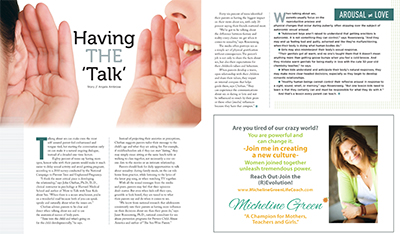 Talking about sex can make even the most self-assured parent feel embarrassed and tongue-tied, but starting the conversation early on can make it a natural ongoing dialogue, instead of a dreaded one-time lecture.
Talking about sex can make even the most self-assured parent feel embarrassed and tongue-tied, but starting the conversation early on can make it a natural ongoing dialogue, instead of a dreaded one-time lecture.
Eighty percent of teens say having more open, honest talks with their parents would make it much easier to delay sexual activity and avoid getting pregnant, according to a 2010 survey conducted by The National Campaign to Prevent Teen and Unplanned Pregnancy.
“I think the most critical piece is developing the relationship,” says John Chirban, Ph.D., Th.D., clinical instructor in psychology at Harvard Medical School and author of “How to Talk with Your Kids about Sex.” “When there is a secure attachment, you’re on a wonderful road because both of you can speak openly and naturally about what the issues are.”
Chirban advises parents to be clear and direct when talking about sex and to use the anatomical names of body parts. “Tune into the child and what’s going on for the child developmentally.”
Instead of projecting their anxieties or perceptions, Chirban suggests parents tailor their message to the child’s age and what they are asking for. For example, if middleschoolers ask if they can start “dating,” they may simply mean sitting at the same lunch table or walking to class together, not necessarily a one-on-one date to the movies or an intimate relationship.
Parents should look for daily opportunities to talk about sexuality: during family meals, on the car ride home from practice, while listening to the lyrics of the latest pop song, or when watching TV together.
With all the sexual messages from the media and peers, parents may feel that their opinions don’t matter. But even when kids roll their eyes, grumble or look bored, they are tuned in to what their parents say and do when it comes to sex.
“We know from national research that adolescents consistently rate their parents as having more influence on their decisions about sex than their peers do,” says Janet Rosenzweig, Ph.D., national consultant for sex abuse prevention programs for Prevent Child Abuse America and author of “The Sex-Wise Parent.”
Forty-six percent of teens identified their parents as having the biggest impact on their views about sex, with only 20 percent saying their friends mattered most.
“We’ve got to be talking about the difference between fantasy and reality every chance we get when it comes to sexuality,” says Rosenzweig. The media often portrays sex as a simple act of physical gratification without consequences. The parent’s job is not only to share the facts about sex, but also their expectations for their children’s values and behaviors.
When parents develop a warm, open relationship with their children and share their values, they impart an internal compass that helps guide them, says Chirban. “They can experience the communications about sex or dating or love and not be influenced so much by their peers or these other (media) influences because they have that compass.”
Sexual Arousal ≠ Love
When talking about sex, parents usually focus on the reproductive process and physical changes that occur during puberty, often skipping over the subject of autonomic sexual arousal.
“Adolescent boys aren’t raised to understand that getting erections is autonomic. It is not something they can control,” says Rosenzweig. “And they may end up feeling bad and guilty, ashamed and like they’re malfunctioning, when their body is doing what human bodies do.”
Girls may also misinterpret their body’s sexual response. “Their genitals get all warm, and no one’s taught them that it doesn’t mean anything more than getting goose bumps when you feel a cold breeze. And they mistake warm genitals for being madly in love with the cute 32-year-old chemistry teacher.”
When kids understand and anticipate their body’s natural responses, they may make more clear-headed decisions, especially as they begin to develop romantic relationships.
“Healthy human beings cannot control their reflexive arousal in response to a sight, sound, smell, or memory,” says Rosenzweig. “But one lesson kids need to learn is that they certainly can and must be responsible for what they do with it.” And that’s a lesson every parent can teach.